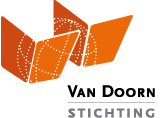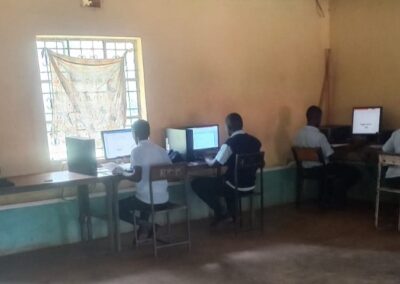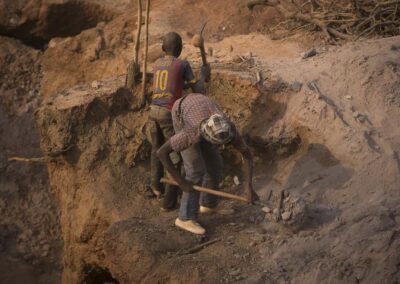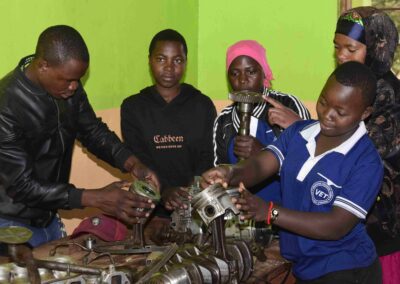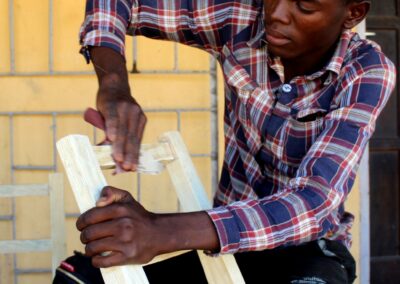The Lambwe Vocational Training Centre in Homa Bay – Kenya wants to improve the quality of education, purchase the necessary teaching materials so that practical lessons can be given with all the necessary means. A lack of machines and tools does not yet make it possible for young people to learn the skills with which they can be employed, find work, or start for themselves a means for living.
An amount of € 4,800 is required to purchase the most needed machines and tools. The Van Doorn Foundation is looking for sponsors to support this project!
Amount required: € 4,800.-
Amount donated: € 3,300.-
Sponsor: Transfair Foundation
Project information
The situation
The Lambwe Vocational Training Centre is located in the rural district of Mbita of Homa Bay. Homa Bay has a population of approximately 1.2 million and a poverty level of 52.9%. Half of the population is between 15 and 50 years old, of which 74% are unemployed or involved in some form of subsistence agriculture. Young people who have completed primary school, have little chance of pursuing further education. For further training, they must go to the city, where training is too expensive for the rural population. The Lambwe Vocational Training Centre offers young people from the Mbita an opportunity to learn a craft.
The importance of the project
Lack of appropriate skills and knowledge is an important factor contributing to youth unemployment and poverty. The Lambwe Vocational Training Centre aims to teach young people the right, market-oriented and immediately employable skills that will help them become self-reliant and give the rural community access to services that so far are only available in the city. Due to a lack of machines and tools, the training is still mainly theoretical and therefore does not make the young people employable. Providing the school with all primary machines and tools to give practical lessons is the goal of this project. The Van Doorn Foundation wants to help the Lambwe Vocational Training Centre to purchase the necessary resources and thereby actually able to teach the young people the skills with which they can immediately be deployed, find work or start for their own.
The implementing organisation
The Lambwe Vocational Training Centre (Lambwe Youth Polytechnic) was established in 2012. It is owned by the government (province) and is managed by a school board appointed by the sub-county. When it was founded, it was given a temporary license to organise 8 courses for a maximum of 300 students. In 2014 it received a permanent license for half of the 8 courses for up to 150 students. The school building has the capacity (classrooms) for 300 students, but due to a lack of training resources and tools it can only provide training to 50 students. The school offers two-year courses for “tailor”, “hairdresser”, “carpenter”, “auto mechanic”, “welding” and “agri-business”.
The envisaged project results
The goal of this project is that the school has the necessary training resources (machines and tools) to provide adequate and qualitative training.
Every year, 100 young people will learn professional skills in the crafts offered in the centre. The two-year courses are expected to benefit 300 young people within five years.
The community will thereby have access to services and goods closer to home, where hitherto people have been forced to travel long distances and dig deep into their pockets for the same.
The school will set up an alumni network that will enable mentoring the students and put them in touch with the labour market. It will give the school the opportunity to stay informed about the demand for crafts and to develop for it the necessary curriculum and courses.
The chance of sustainability
The school has classrooms and workshops and enough ground for possible extensions. Recently a school business plan has been developed to guarantee the professionalism and sustainability of the school. The courses cost an average of € 150 per student and are funded from collected school fees (€ 60 per student) and a government subsidy (€ 90 per student).
The intended practical-oriented training courses must enable students to make assignments, deliver products that can be sold, and generate the necessary income for the centre to pay for the course material themselves. A market survey has shown that there is a demand for the products made by the students in the school. Information and open school days will convince more young people to register, which will result in more school fees and more government subsidy. A special fundraising team in which all stakeholders participate will focus on fundraising for future extensions to the school.
The progress of the project
The improve the quality of the vocational training, the necessary training resources (machines and tools) have been ordered and will be made available by the Tools To Work foundation from The Netherlands.
The COVID-19 pandemic is impacting the project by substantial delays in the shipment of equipment and tools.
The results
After almost a year of delay due to the covid-19 pandemic, the container with machines and tools arrived early 2022 in Kenya and the school could start providing practical lessons in the 2022-2023 school year.
For these projects your support is necessary!
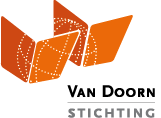
Dear visitor,
We are grateful that you are willing to support us with a donation!
Please fill in the fields below and push the button PAY to transfer the amount by iDeal.
